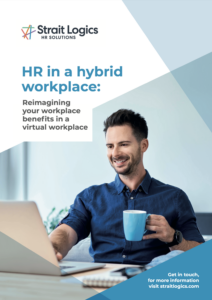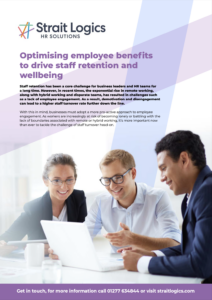
The working world has changed beyond recognition in the past two years. That means, with the flexibility it allows, remote working has changed the priorities and needs of your employees.
Keeping hold of talent was always a challenge for HR teams at the best of times, but in this brave new world of digital transformations, improved mobility and much greater freedom for your staff, businesses must wise up to a whole new era of employee experience.
The employee experience era
As a result of the global health crisis and the mandated flexibility it caused, there has been something of a switch in power between employers and employees. Inevitably, enabling remote working en masse means opening employees’ eyes to the possibilities of flexibility, and a better work-life balance.
Now as businesses debate how or whether to return to the physical office environments of before, they must adhere to a completely different set of employee demands and priorities or risk losing talent.
During such turbulent times, we’ve seen a significant change in the jobs market. According to the employment agency Reed, last year we saw a 237% year-on-year increase in job vacancies as of May 2021 as employees jumped ship, sought out another role, went freelance, or started a whole new venture.
The job market continues to boom this year, with the ONS (Office of National Statistics) reporting a whole new record of job vacancies, 1,318,000 between December 2021 and February 2022.
What this means for employers
All this means that the pressure is on for employers to provide an employee experience that makes their workers want to stick around. Failing to pay heed, might mean their talented staff will find a new way to build their work around their new lifestyle.
In the same vein, attracting new talent isn’t going to be easy either if employee expectations are not met.
For the most part, it’s the younger generations that are calling for better workplace flexibility, with nine out of ten millennials expecting a flexible working week.
If employers are looking for their future leaders, or simply wanting to attract and retain a youthful workforce, flexibility and balance are key as Millennials and Gen Z workers call for hybrid working.
How to retain staff in a tight talent market
Simply put, staff retention means the ability the keep employees under contract, which in turn allows for a workforce with better longevity, efficiency and stability. For the most part, it’s more efficient to retain the staff you have as hiring and training new employees can put a real strain on your resources.
So, it’s important to be aware now of the need of your workers and any calls for better flexibility, adaptability and remote or hybrid working conditions. Listening to your staff is the first key step in building a workplace culture that nurtures and retains staff.
Here are a few of the tips and best practices to consider if you want to keep hold of your talent in a strong job market.
Conduct staff surveys
One great way to collate and listen to the needs and desires of your workforce is by conducting regular staff surveys. With regular polls or questionnaires, you can canvass opinions, and collect data on general sentiment and attitudes towards your place of work. From here, understanding the key desires and needs of your workers will help you to build a better employee value proposition (EVP) in a more remote working landscape.
Invest in your people
Your employees want to feel valued, as part of the bigger picture of your business. Workers want to know they will play a part in your growth plans and the future success of the business. That means, investing in your workers is more important now than ever. Offering a holistic training budget and training schemes are a good place to start to help your talent feel they have a future as part of the company.
What’s more, investing in training and upskilling your staff means you’ll be able to promote from within your current workforce, saving time on hiring, onboarding and training new candidates.
Build a remote working culture
One aspect of remote working that’s easy to neglect is your workplace culture. Your culture won’t be the same in a hybrid or remote working world, it requires more mutual trust, better communication and more openness between employees and senior leadership teams. Building values and culture into the new version of your normal working routine is really important so that your employees can stay aligned, and not feel alienated by outdated ideals and standards.
Tailor your Employee Value Proposition
Once you’ve acknowledged the risks of a strong job market, reviewing how you can make life better for your employees is an important cornerstone. Now that you’ve reviewed employee sentiment, and gathered information on what your workers want, it’s important to tailor your employee value proposition (EVP) to suit your workers and align with your business goals. In addition to offering better flexibility through remote working, hybrid working and flexible hours, businesses will need to take a look at their rewards schemes and make sure each individual is catered for, with a good variety of benefits and perks.
Employee experience goes beyond the salaries you offer. While during the cost-of-living crisis, net pay is important, staff want to feel they’re worth more than just a number, which is why offering workplace perks is really important. During such times of change and turmoil, it’s important to think about wellbeing as well as lifestyle, with benefits including occupational therapy or counselling, as well as discounts on high-street brands where workers can make savings.
It’s more important now than ever to rise to the challenge and offer a more holistic approach to your employee experience. Organisations that listen to their staff, and take action are those that will reach the top of the list when it comes to desirable workplaces.
For more information on how Strait Logics could help you to retain and engage your staff in the year of The Great Adjustment by offering flexible, personalised benefits, get in touch today.

